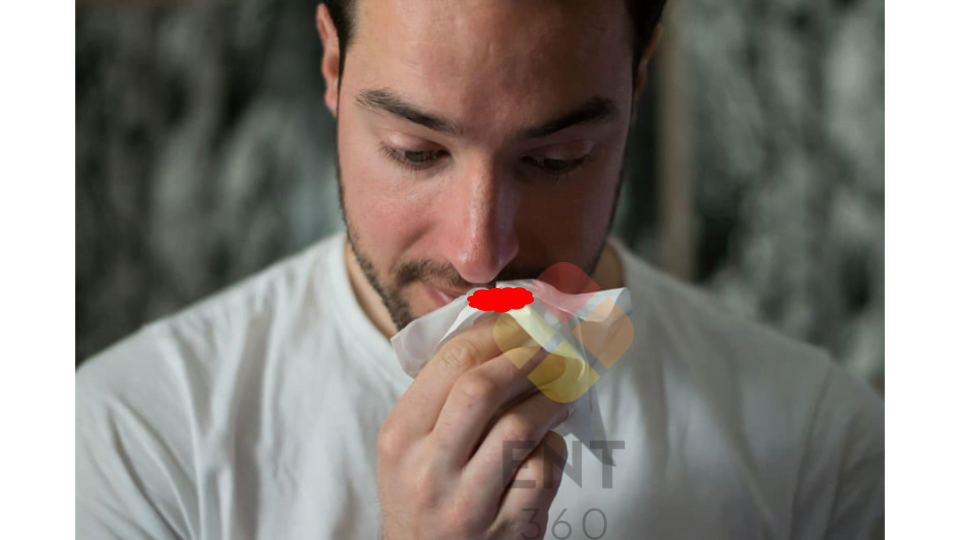Summer brings sunshine, vacations and, for some, nosebleeds. You’re not alone. While not exactly on the top of anyone’s summer wish list, nosebleeds are more common during the warmer months. Understanding the reasons behind nosebleeds in summer and how to prevent them can help you avoid a bloody mess and enjoy a summer free from facial drips.

The Delicate Dance of Blood Vessels in Your Nose
The inside of your nose is lined with a thin mucous membrane packed with tiny, fragile blood vessels. This network helps humidify the air you breathe and trap dust and allergens. However, due to their delicate nature, these blood vessels are prone to rupture, causing a summer nosebleed.
The Culprit: Dry Summer Air
So, why does summer increase the risk of nosebleeds? The main culprit is dry air. During summer, the humidity levels often drop significantly. This dry air dries out the mucous membrane in your nose, making it more susceptible to cracking and irritation. These cracks can expose the underlying blood vessels, increasing their risk of rupturing and causing a nosebleed.
Other Triggers for Nosebleeds in Summers:
- Increased Air Conditioning Use: While air conditioning provides welcome relief from the heat, it can further dry out the air inside your home, exacerbating the problem.
- Dehydration: Not drinking enough water during hot weather can also lead to a dry nasal passage, which can increase the likelihood of nosebleeds.
- Allergies: Seasonal allergies, prevalent during summer, can irritate the nasal passages, leading to picking or rubbing the nose, which can easily damage the blood vessels.
- Sinus infections can cause inflammation and congestion, putting additional strain on the nasal blood vessels.
Minimizing Nosebleeds in Summer:
While you can’t control the weather, you can take steps to minimize your risk of nosebleeds during the summer:
- Hydrate: Consume fluid daily to keep your body and nasal passages well-hydrated. Aim for eight glasses of water daily, depending on your activity level.
- Moisturize the Air: Use a humidifier to add moisture back into the air. It helps prevent the nasal membranes from drying out. The humidifier’s aim should be a humidity level between 30% and 50%.
- Saline Nasal Sprays: Regular saline nasal sprays, readily available over the counter, can help moisten and soothe irritated nasal passages. They are safe for regular use.
- Limit Nose Picking and Blowing: Picking or rubbing your nose can irritate and damage the blood vessels, increasing the risk of bleeding. Try gently blowing your nose instead, and avoid forceful blowing or sniffing.
- Manage Allergies: If you suffer from seasonal allergies, consult your doctor about medication to manage symptoms and minimize nasal irritation.
When to Seek Medical Attention for Summer Nosebleeds?
Most nosebleeds in summer are minor and stop on their own within a few minutes. However, look out:
- If the nosebleed lasts longer than 20 minutes
- If one feels dizzy or lightheaded with a nosebleed
- If the bleeding occurs frequently
- If it produces a large amount of blood
For the above-mentioned conditions, it’s crucial to seek medical attention immediately. These could indicate an underlying medical condition requiring professional evaluation.
Enjoying a Summer Free from Bloody Tissues:
Understanding the causes of nosebleeds in summer and its prevention can significantly reduce your risk of experiencing this unpleasant issue. Simple steps like staying hydrated, keeping your nasal passages moist, and managing allergies can bring a sense of relief and comfort, allowing you to enjoy a summer filled with sunshine and refreshing activities, not bloody tissues.
This article was edited by Dr Akanksha Saxena, Consultant ENT, Head & Neck Surgeon, ENT360, DLF Phase 1 and Sector 52, Gurgaon. She is an ENT Specialist in Gurgaon with over 14 years of experience. Read more of her blogs here.


